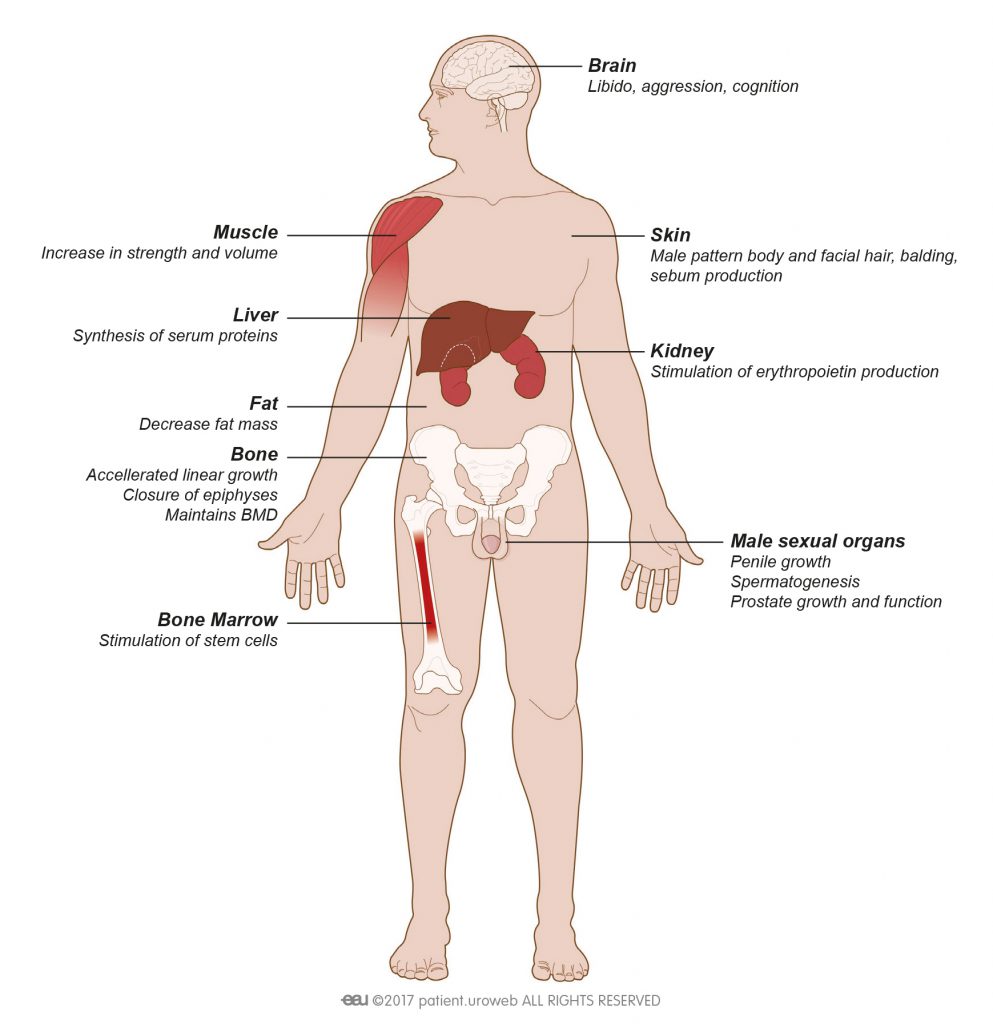- deep voice
- muscle tone
- bone strength
- hair pattern (and balding)
- sex drive
- achieving and maintaining erections
- general sense of male well-being

How will my testosterone level be affected by an orchidectomy?
Having one testicle removed should not affect the overall testosterone level in the body, providing the remaining testicle is healthy. In some men such as those who have had, or are having chemotherapy, testosterone production can be reduced. This is usually not permanent, but it may take some time after treatment for testosterone levels to recover.
Men who have had a bilateral orchidectomy (both testicles removed) will have a minimal level of testosterone and will need testosterone replacement therapy.
How will I know if my testosterone is low?
Possible symptoms of low testosterone include:
- Tiredness
- Low mood
- Confusion and feeling emotional.
- Hot flushes.
- Weight gain
- Loss of muscle strength.
- Loss of or difficulty in achieving normal erections on waking up in the morning
- Fall in sex drive (loss of libido)
- Difficulty in maintaining erections strong enough for masturbation or sexual intercourse.
- Breast swelling (gynaecomastia)
Long term symptoms
- Thinning of the bones (osteoporosis)
- Increased risk of cardiovascular disease.
The blood test to measure testosterone levels.
Testosterone levels can be checked by a blood test. Testosterone levels are at their highest early in the morning, and this is when the blood test should be performed.
What is the normal level?
Testosterone levels can be checked by a blood test. Testosterone levels are at their highest early in the morning, and this is when the blood test should be performed. If your testosterone level is low, then a further blood test should be repeated, and you may need to start testosterone replacement. If the levels are borderline, they will need to be checked regularly but if you are experiencing symptoms of low testosterone, a trial of testosterone replacement therapy may be recommended to see if symptoms improve.
If a man is worried that they may have a low testosterone level, they should speak to their specialist team who can arrange a blood test and if necessary, refer them to a hormone specialist (endocrinologist).
| Type | Formulation | Side effects |
| Taken by mouth |
|
|
| Injected into the buttock or arm |
|
|
| Applied to the skin |
|
|
How do I know if the treatment is working?
Testosterone levels will be checked on a regular basis. Most people start to feel better within a few weeks of treatment, but it may take 3 months to feel the full effects. If testosterone replacement therapy improves symptoms, then it can be continued indefinitely. In some men who have had a unilateral orchidectomy, testosterone levels may eventually return to normal, and therapy can be discontinued.
Are there any side effects?
Although testosterone is commonly thought to cause aggression and hostility, it helps the body deal with challenging and stressful events or situations. Common side effects are oily skin and spots. Less often, people complain of headaches, nausea, excess sweating, tiredness, and mood changes.
Testosterone does not cause prostate cancer but can increase the size of the prostate. Testosterone actively “feeds” prostate cancer and treatment may not be started in people with active prostate cancer.
Men should never stop testosterone treatment without consulting their GP or specialist team.
Is there anything I can do to improve my testosterone levels?
- Physical exercise is very good for improving energy levels, reducing anxiety and low mood while increasing feelings of general well-being. A few seconds sprinting can increase testosterone levels, while exercise such as brisk walking or supervised cardiovascular training may also help.
- Sleep – a good night’s sleep can help increase testosterone levels naturally.
- Avoid stressful situations. Practice relaxation techniques such as deep breathing or other natural ways to reduce stress levels. Stress will lower testosterone levels.
- Avoid excessive alcohol intake. Alcohol can lower testosterone levels.
- Try and eat a healthy mixed diet and keep to a healthy weight. Being overweight leads to a fall in testosterone.

